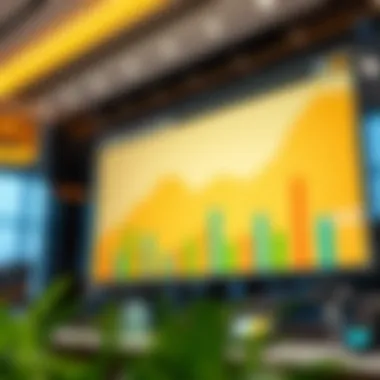Impact of الف درهم جديد on Dubai's Real Estate Market


Intro
The arrival of الف درهم جديد into Dubai's economic fabric has stirred considerable buzz, particularly within the real estate sector, a cornerstone of the city’s rapid development. Recognizing the intricacies involved, this article invites investors, homeowners, agents, and analysts to explore how this substantial financial element influences investment prospects, market dynamics, and property values. With the ongoing evolution of Dubai—a city known for its architectural marvels and cultural diversity—the interconnection between this monetary innovation and the real estate landscape becomes increasingly evident.
Through comprehensive analysis, we will delve into various aspects such as market trends, investment opportunities, and how shifting demographics are changing the game. This isn’t just another deep dive into figures and projections; it’s about understanding the broader narrative of a city that continually reshapes itself, fueled by ambition and innovation.
As we walk through the current real estate landscape, track property price trends, and identify high-return areas alongside upcoming developments, the aim is to paint a coherent picture of a market in flux and the opportunities that arise within it. Let's get started.
Prelude to الف درهم جديد
The introduction of الف درهم جديد marks a pivotal moment in Dubai's economy, especially concerning its real estate landscape. This fresh currency, characterized by its unique properties, does more than just fit the pocket of potential homeowners or investors; it has the power to reshape market dynamics. An understanding of الف درهم جديد is not just important for those deeply invested in the market, but essential for anyone looking to grasp the underlying forces driving property valuations and investment opportunities in this fast-paced environment.
In the context of real estate, the implications of الف درهم جديد are far-reaching. It carries with it a sense of economic stability, a notion that could attract foreign investors who are often wary of volatility. The arrival of this currency could enhance purchasing power, allowing individuals to either invest or acquire property more readily. Therefore, it is crucial to consider how هذا المبلغ has the potential to influence not just prices, but also buyer sentiment and market confidence.
By delving into the nuances of what الف درهم جديد means for the average investor as well as for large-scale developers, one can glean a better perspective on its expected impact. It lays a framework for understanding the intertwining factors at play—be it demographics, architectural innovations, or economic indicators—all of which will be analyzed comprehensively in this article.
"Currency isn't just about cash; it’s about confidence and community trust in the market's future."
In sum, as we branch into the specifics surrounding الف درهم جديد, we illuminate its importance in streamlining investments, influencing property demand, and shaping Dubai’s real estate narrative.
Understanding الف درهم جديد
الف درهم جديد, which translates to "one thousand dirhams new," represents a significant financial instrument for residents and investors in Dubai. This currency is expected to streamline transactions, foster economic growth, and facilitate smoother investments in real estate sectors. By exploring its properties, nuances, and intended functionality, one can appreciate its role as a cornerstone in modernizing Dubai’s economy.
For instance, many experts argue that its circulation can enhance liquidity in the property market, making it easier for buyers to transact. This could be especially advantageous in an environment where speed and certainty are valued, reacting to the often unpredictable nature of real estate. The adaptability of الف درهم جديد in various sectors beyond residential properties—such as commercial spaces and tourism-related investments—further amplifies its relevance.
To sum it up, grasping the fundamental attributes of الف درهم جديد will set the stage for a deeper understanding of its broader economic impact.
Historical Context of Currency in Dubai
The evolution of currency in Dubai reveals a tale of innovation and adaptation. Historically, the region transitioned from barter systems to the introduction of various currencies, reflecting the changing economic landscape and societal needs. This historical context is vital, as it provides perspective into the current implications of الف درهم جديد.
Before the Emirate standardized the dirham as its official currency in 1973, trade was often conducted using both Indian rupees and British pounds, illustrating Dubai's foundational role in commerce amid the Arabian Gulf. Fast-forward to today, and the introduction of الف درهم جديد speaks to an ongoing commitment to banking modernization and economic resiliency.
As economic challenges arise—such as inflation or fluctuating foreign investments—the flexibility of currency adapts to meet these challenges, ensuring the market remains robust. Understanding the historical shifts allows one to see the roots of why الف درهم جديد is essential not only in improving transaction efficiency but also in strengthening investor confidence in the long term.
In reflection, the stages of currency evolution in Dubai underpin the transformative potential of الف درهم جديد, signaling a future where real estate can flourish in newfound economic climates.
Key Economic Factors Influencing Real Estate
The dynamics of the real estate market in Dubai are deeply intertwined with economic factors that hold significant sway over property valuations and investment patterns. Understanding these factors is essential for any investor, homeowner, or analyst aiming to navigate this vibrant landscape effectively. In particular, the deployment of الف درهم جديد adds a new layer of complexity, influencing everything from buyer sentiment to overall market regulations.
Inflation and Property Prices
Inflation acts as a double-edged sword in the realm of real estate. On one hand, property values often surge during inflationary periods as construction costs skyrocket and the price of living rises. Dubai has seen its share of this phenomenon. For instance, in the wake of a recent economic uptick, property prices in high-demand areas like Downtown Dubai and Dubai Marina have swelled, reflecting the rising costs of materials and labor. This uptrend can create a compelling justification for investors to either purchase or sell properties.
However, the flip side is that inflated prices can discourage new entrants to the market. Potential homeowners or investors might find themselves squeezed out, fearing they can’t keep pace with escalating prices.
Inflation impacts the cost of living, thus affecting projections on rental yields and overall profitability.
Additionally, inflation often leads to increased interest rates, making mortgages more expensive. This means that buyers may need to stretch their budgets. Investors typically need to tread carefully in such climates, weighing the potential for appreciation against the risks associated with financial strain on buyers.
Ultimately, inflation introduces a level of unpredictability in property pricing, and therefore, continuous monitoring of inflation metrics is crucial for stakeholders in the Dubai real estate market.
Foreign Investment Trends
Foreign investment has become a cornerstone of Dubai’s real estate market, shaping it into a global hub. The influx of international capital is driven by several factors, including Dubai's strategic location, booming tourism, and friendly regulatory frameworks. The introduction of الف درهم جديد may act as an attractive proposition for foreign investors seeking stable returns.
As regulations around foreign ownership of property have become more favorable, there’s an increasing tide of investment from countries ranging from India to Europe. Properties in Dubai are increasingly seen as safe havens for wealth, bolstered by the promise of economic growth and the city’s rapid development plans.
"The rise in foreign investment has undeniably altered the landscape of the Dubai real estate market, allowing for both volatilities and opportunities."
Factors influencing this trend include:
- Government Incentives: Programs that support foreign direct investment can bolster interest.
- Exchange Rate Stability: A stable exchange rate can further entice foreign buyers who wish to hedge against economic uncertainty at home.
- Lifestyle Appeal: Dubai’s cosmopolitan lifestyle and amenities draw high-net-worth individuals who prioritize not only investment but also quality of life.


Nevertheless, one must keep an eye on geopolitical factors, global economic conditions, and currency fluctuations, as they may impact decisions made by foreign investors. Together, these elements create a multifaceted environment that stakeholders must remain aware of.
In essence, key economic factors, especially inflation and foreign investment trends, are vital in understanding Dubai's real estate market dynamics, particularly as the introduction of الف درهم جديد shapes market participation, trends, and property valuations.
Demographic Changes in Dubai
Demographic changes are at the heart of any city's evolution. In Dubai, where the skyline is sparkling with modern towers and diverse cultures mingle, understanding how shifts in demographics influence the real estate market becomes crucial. The evolving population dynamics not only reflect the lifestyles and choices of individuals but also shape housing demand, investment strategies, and urban planning. When more people flood into the city seeking job opportunities or better living standards, the implications on property prices and availability cannot be overstated.
Population Growth and Housing Demand
Dubai's population growth is nothing short of remarkable. Between 2020 and 2023, the emirate has seen an influx of residents, with estimates occasionally touching around three million. This surge naturally heightens demand for housing, pushing developers to keep pace with rapid changes.
- The construction of new residential projects is skyrocketing.
- High-rise apartments, luxury villas, and affordable housing options are all sprouting like wildflowers.
In this environment, prices for real estate can shift dramatically. Increased demand often leads to higher rents and property costs. For example, neighborhoods such as Dubai Marina and Downtown Dubai are experiencing a renaissance, attracting both local and foreign investors.
"A rising tide lifts all boats," and in the real estate hemisphere of Dubai, this isn't just a saying, it is a lived reality. When housing demand rises, it invariably leads to enhanced property valuations, altering how investors view their portfolios.
However, it's not just about growth; the quality of life is at stake. With so many people moving in, ensuring that infrastructure and public services keep up is a challenge. Schools, hospitals, and parks must be prioritized to maintain a desirable living environment.
Expatriate Influence on the Market
Expatriates represent a significant portion of Dubai’s population, accounting for nearly 90% of residents. This multicultural tapestry greatly influences the real estate market in several notable ways. Expatriates often bring varying perspectives on housing, based on their home countries’ norms and preferences.
- Rental Market Dynamics: Many expatriates prefer to rent rather than buy due to the flexibility that renting affords in a city where job security can be uncertain. This has led to a robust rental market attracting continual investments.
- Luxury Preferences: As more well-off expatriates settle in the city, there is a noticeable spike in demand for luxury accommodations. This has brought a surge in high-end residential developments, stretching from bespoke villas in Palm Jumeirah to sleek lofts in Business Bay.
Moreover, expatriate communities tend to cluster in particular neighborhoods, impacting the local real estate dynamics heavily. Places like Jumeirah Village Circle and Dubai Silicon Oasis have become hotspots due to their appealing amenities aimed at foreign nationals.
Understanding these aspects is fundamental for any investor or homeowner looking into Dubai’s real estate market. With a multinational population comes diverse demands, which can yield both challenges and opportunities in investment strategies. As demographic trends evolve, a close watch on these shifts can provide invaluable insights for astute market observers.
Architectural Developments and Urban Planning
Architectural developments and urban planning are pivotal to understanding the dynamic landscape of Dubai's real estate market. With its continuously evolving urban fabric, Dubai exemplifies a city that does not hesitate to reinvent itself. The strategic planning and design of urban spaces can enhance property value, influence demand, and shift perspectives on what living and working spaces should represent.
Innovative Real Estate Projects
Innovative real estate projects in Dubai showcase not just architectural prowess but also a forward-thinking mentality that addresses the practical needs of its diverse population. Developments like the Dubai Creek Tower, set to outshine the Burj Khalifa, aim to redefine the skyline with stunning designs and advanced technology. Such projects cater to both luxury and functionality, appealing to a wide range of investors and potential homeowners.
In the realm of community building, projects like City Walk demonstrate how integrated urban spaces can foster social interaction and economic activity. Blending retail with residential areas creates a vibrant atmosphere that can draw both locals and tourists alike. These types of projects are crucial as they contribute to enhancing the overall quality of life, something that residents and investors look for when considering property acquisitions.
Key features of innovative real estate projects in Dubai often include:
- Smart City Solutions: Integrating technology to manage resources efficiently and enhance living standards.
- Mixed-Use Developments: Creating neighborhoods where people can live, work, and play, reducing the need for extensive commutes.
- Cultural Integration: Incorporating local culture into design, making spaces resonate with history while being modern.
Sustainability in Urban Developments
Sustainability has emerged as a cornerstone of architectural developments in Dubai. The push for energy efficiency and resource preservation is not just a trend; it's a necessity given the challenges posed by rapid urbanization and population growth. Projects like the Sustainable City embody this philosophy, featuring solar panel installations, energy-efficient buildings, and a design that promotes a car-free lifestyle.
These sustainable urban developments impact the real estate market significantly. They attract environmentally conscious investors and homebuyers who prioritize sustainability as a key deciding factor. As such, properties that feature energy-efficient systems and are designed to minimize their carbon footprint often command higher prices and quicker sales.
Consider the following trends driving sustainability in Dubai’s real estate:
- Green Certifications: Buildings are increasingly being designed to meet rigorous environmental standards.
- Urban Green Spaces: Integrating parks and nature into the urban environment improves air quality and overall community well-being.
- Water Conservation Efforts: Innovations in water recycling and management are becoming standard in new developments, essential given the region's arid climate.
"In an era where climate change is at the forefront, Dubai's efforts to integrate sustainability into its urban planning not only enhances its global image but also aligns with the evolving preferences of investors and residents alike."
As architectural innovation intertwines with sustainability, the real estate market in Dubai stands at the precipice of transformative growth. Investors with an eye for these developments may find themselves in a promising position as الف درهم جديد continues to influence the avenues of investment within this modern metropolis.
Investment Opportunities in Dubai
Navigating the investment landscape of Dubai offers a myriad of avenues for those keen on maximizing returns and capitalizing on rapid urban growth. The infusion of الف درهم جديد into the market acts as a catalyst for new investment opportunities, significantly altering the dynamics of property valuations and market conditions. With Dubai being a global business hub, various factors interconnect, making it all the more vital that both potential and existing investors grasp these emerging opportunities.
The vibrant nature of Dubai’s real estate market invites an understanding of diverse factors. Real estate here isn’t just about structures and land; it’s a dynamic equation of supply and demand, driven by global trends and local policies. With the spotlight on الف درهم جديد, investors are encouraged to assess why now could be the prime moment for engaging with new projects and portfolios in the area.
Emerging Markets within Dubai


The quest for profitability in Dubai's real estate sector requires keen insight into emerging markets. Neighborhoods that were once overlooked are now attracting attention due to affordable pricing and government backing. Areas like Dubai Investments Park and Dubai South are seeing an upsurge in investment interest. The appeal lies in several factors:
- Affordable Housing Options: With a plethora of mid-range price points, these neighborhoods cater to a broader range of buyers, including young professionals and families.
- Infrastructure Development: Several infrastructure projects are in the pipeline, enhancing connectivity and accessibility to these suburbs.
- Strategic Importance: Places near major developments like Expo 2020 site (now the Dubai Expo City) have skyrocketed in desirability. As businesses set up shop, the demand for housing and commercial space in these emerging areas is primed to balloon.
Investors are keeping a close eye on freehold versus leasehold zones as well, to decide where their money might yield the best returns—opting for areas where the property market hasn’t yet peaked.
Benefits of Investing in الف درهم جديد
Investors who appreciate the implications of الف درهم جديد find themselves with unique advantages in the Dubai market. The local currency carries a strong symbolism of stability amidst fluctuating global economic variables, positively affecting investor confidence. Key benefits include:
- Enhanced Purchasing Power: With a favorable exchange rate, international investors can capitalize on more attractive property prices.
- Robust Legal Framework: Investors in الف درهم جديد can rest easy knowing that Dubai offers a transparent legal structure that supports property ownership, especially for foreign nationals.
- Market Resilience: Historical data showcases that despite fluctuating oil prices and global economic shifts, Dubai's real estate market has shown resilience. This bodes well for new investments and long-term growth.
Market Analysis: Trends and Predictions
In today’s ever-evolving landscape of Dubai's real estate market, keeping your finger on the pulse of trends and predictions is absolutely crucial. The market analysis serves as a compass, guiding investors, homeowners, agents, and analysts through the multitude of influences shaping property values and opportunities. Understanding current market dynamics is not merely beneficial—it’s essential for making informed decisions.
By examining the intricacies of supply and demand, economic factors, and demographic shifts, stakeholders can better anticipate shifts in the market, helping them to position investments wisely. Essentially, market analysis reveals not just what’s happening now but also hints at what’s around the corner, enhancing investment strategies and start getting ahead of the competition.
Current Market Trends
As of late 2023, Dubai's real estate sector is marked by several potent trends. One of the foremost observations involves a noticeable shift towards affordable housing. With the influx of expatriates and young professionals, demand for budget-friendly accommodations continues to rise. Properties in areas such as Dubai Marina and Jumeirah Village Circle (JVC) are gaining traction due to their competitive pricing compared to the more luxurious options that were once the center of attention.
Additionally, technology is reshaping the way properties are being marketed and sold. Increased use of virtual tours and augmented reality experiences is becoming commonplace, enabling buyers to explore homes more thoroughly ahead of purchase, without ever stepping foot in the property. This trend not only enhances buyer experience but also streamlines transactions.
Furthermore, sustainability is becoming a central theme in new developments. Investors and developers are prioritizing eco-friendly features, as the demand for greener living spaces rises. Innovations like solar panels, green roofs, and energy-efficient designs are not just trends; they are becoming essential components in attracting buyers.
Other notable trends include:
- Increased Foreign Investment: As new visa rules attract more global investors, the influx of foreign capital is helping to bolster the market further.
- Luxury Segment Resilience: Despite economic fluctuations, the luxury sector continues to perform well, particularly in prime areas like Downtown Dubai and Palm Jumeirah.
Forecasting Future Trends
The real estate market in Dubai is never short of surprises, and making forecasts is an intricate exercise that requires combining all current trends with historical data and economic indicators. Looking ahead, one major prediction is that remote work will continue to impact housing styles and locations. More people are expected to prioritize space over place, leading to a greater demand for larger homes, possibly in suburban areas. Properties near Dubai’s metro lines or other public transport hubs may become increasingly appealing as commuting preferences evolve.
Additionally, as the global economy stabilizes, it is likely that we will see a rebound in high-end developments. Expo 2020, despite being postponed, drew international attention and investment to Dubai’s real estate sector. This renewed interest could spark an acceleration in luxury projects geared towards high-net-worth individuals.
Moreover, technological advancements are anticipated to continue their integration into the real estate process. The potential use of blockchain for securing property transactions and the implementation of 3D printing in construction could revolutionize the market and affect costs positively.
In summary, while no one has a crystal ball, understanding current trends and forecasting future movements equips all concerned—investors, developers, and homeowners alike—with the knowledge to navigate Dubai’s dynamic and challenging real estate landscape effectively.
"In real estate, what is an opportunity today could be a missed chance tomorrow. Always stay ahead of the trends to avoid being left behind."
Useful Resources:
Lifestyle Considerations in Dubai's Real Estate
Dubai's real estate market is shaped by various lifestyle factors, which can bring significant benefits to investors and homeowners. Understanding these lifestyle considerations is crucial when navigating the complexities of property investment in this vibrant city. Key elements include living standards, amenities, and cultural influences, all of which play a pivotal role in property valuation and desirability.
Living Standards and Amenities
Living in Dubai offers a unique blend of luxury and ease that attracts individuals from around the globe. The city boasts a range of living standards, catering to diverse tastes and budgets. High-rise apartments in areas like Downtown Dubai offer breathtaking views of the Burj Khalifa while communities such as Dubai Marina provide waterfront living with a lively atmosphere.
Amenities are another strong selling point. Most modern residential developments come loaded with facilities including pools, gyms, and parks. For families, proximity to schools and healthcare is essential. Notably, areas such as Jumeirah and Arabian Ranches have high-quality schools and hospitals nearby, which adds significant value to the properties.
- Some high-end projects even offer concierge services, ensuring that residents enjoy a convenient lifestyle.
- Furthermore, unique features like sustainable designs and smart home technology are becoming increasingly popular, appealing to environmentally conscious buyers.
Quality of life is deeply intertwined with real estate in Dubai, and as such, understanding these elements helps buyers align their property choices with their lifestyle preferences.
Cultural Influences on Housing Preferences
Cultural diversity in Dubai makes it a melting pot of values and lifestyles, influencing housing preferences significantly. Expatriates form a large part of the population, bringing with them varied expectations for housing. For instance, while some may prefer the modern, minimalist design, others might lean towards properties that reflect their heritage.
- In areas with a high concentration of a specific nationality, such as the Lebanese community in Jumeirah, you can often find architectural styles that resonate with their cultural roots.
- Additionally, the demand for community-oriented designs has been on the rise, encouraging developers to create neighborhoods that prioritize family living.


Living arrangements also differ across cultures. Some may seek out larger homes to accommodate extended family living, while others might prefer compact, low-maintenance residences. This cultural blend shapes how properties are marketed, leading to increased customization and personalization in new listings.
"In Dubai's real estate market, understanding lifestyle nuances is just as vital as knowing market trends."
For more insight about lifestyle factors impacting real estate, explore resources such as Encyclopedia Britannica and Wikipedia for broader context.
Regulatory Environment of Dubai Real Estate
The regulatory environment surrounding Dubai's real estate market plays a central role in shaping investment opportunities and guiding property transactions. Investors and homeowners alike need to navigate this complex landscape, as laws and regulations not only protect their interests but also influence the overall market dynamics. Understanding this environment is crucial to making informed decisions and ensuring long-term success in real estate ventures.
Legal Framework for Property Investment
Several laws govern property investment in Dubai, creating a structured and transparent market for both local and foreign investors. One key piece of legislation is the Real Estate Regulatory Agency (RERA) law, which aims to protect the rights of all parties involved in property transactions. RERA handles everything from project regulation to the handling of disputes, aiming to create a safe environment for buyers and sellers.
- Ownership Rights: Foreign investors are allowed to buy property in designated areas, ensuring they have an equal footing in the market. However, understanding these zones and the specific restrictions is essential. For instance, properties in areas like Dubai Marina allow expatriates full ownership rights, while other locations may have specific limitations.
- Documentation and Processes: Legal documents, such as contracts and agreements, must adhere to local laws. It's vital for investors to work with legal advisors who are well-versed in Dubai's real estate framework to avoid potential pitfalls.
- Transfer Fees and Taxes: On top of the purchase price, buyers must factor in additional costs such as transfer fees and maintenance charges, which can add a significant amount to the overall investment.
It’s crucial to have proper legal guidance when navigating Dubai's real estate market; one misstep can lead to financial loss.
Government Initiatives and Support
Dubai's government has rolled out various initiatives to bolster the real estate sector, enhancing the appeal for investors.
- Vision 2040: This initiative focuses on sustainable living and urban development, signaling the government's commitment to long-term growth. The emphasis on sustainability opens avenues for eco-friendly investments, attracting a niche market.
- Investor Residency Options: Recent policies now allow investors to obtain residency visas tied to their property investments. This initiative serves as a valuable incentive for foreign capital, making Dubai an attractive destination for expatriates looking for a permanent base.
- Simplification of Processes: The government continuously strives to simplify the real estate transaction process. Digital platforms allow for easier documentation processes and enhanced transaction transparency, reducing the bureaucratic overhead traditionally associated with real estate transactions.
By addressing the needs of investors and implementing modern regulatory frameworks, Dubai’s government not only protects the property market but also fuels its growth in a global context. This collaborative approach lays the foundation for a thriving real estate landscape that can adapt to the challenges of tomorrow.
Challenges Facing the Real Estate Market
The real estate market in Dubai is a fluctuating landscape, subject to various challenges that can hinder growth and stability. Understanding these obstacles is crucial for investors, homeowners, and market analysts. These challenges include economic uncertainties and saturation issues, both of which can influence investment decisions and overall market health. In examining these aspects, one can gain a more nuanced view of how الف درهم جديد integrates with the complexities of Dubai's real estate sector.
Economic Uncertainties
Economic uncertainties can cast a long shadow on the real estate market. Investors often find themselves second-guessing their moves in an unpredictable financial environment. Factors like global economic shifts, inflation rates, and fluctuating oil prices can heavily impact Dubai, known for its reliance on these elements.
Real estate, being a long-term investment, needs stability for sustainable growth. When the economy is unstable, potential buyers become hesitant, stalling transactions and lowering property values. This reluctance can trigger a ripple effect, causing even seasoned investors to tread carefully, worried about returns.
To paint a clearer picture, consider how external factors such as geopolitical tensions can influence investor confidence. For example, if tensions rise in a region, foreign investors may pull back from the Dubai market, wary of potential disruptions. This could stagnate ongoing developments and lead to unexpected delays in construction and sales.
Additionally, fluctuating interest rates play a significant role. Should lenders increase rates in response to inflation, borrowers might find themselves unable to secure financing or, worse, face higher monthly payments. These concerns may force many to rethink their purchasing decisions.
"Economic shifts can turn the tides; one must be ready to adapt or risk being washed away in turbulent waters."
This volatile environment necessitates strategic planning from stakeholders; understanding market signals and adapting to changes quickly can mitigate some of the risks associated with economic uncertainties. Keeping a sharp eye on market trends can be vital in making informed decisions that may offer better protection against downturns.
Market Saturation Issues
Another pressing concern is market saturation, a situation where the supply of available properties exceeds demand. In a booming market like Dubai’s, this can seem counterintuitive. However, if too many developments come online simultaneously, buyers may be overwhelmed with choices, leading to a lag in sales and potentially significant price drops.
As developers rush to capitalize on the demand stigma fueled by الف درهم جديد, the quantity of new builds can overcrowd existing offerings. Buyers might then pick and choose while waiting for the right absolute deal. This saturated market may strangle the growth potential for properties that aren't fit to compete, often resulting in longer selling times.
To help visualize the gravity of this issue, it’s worth noting that several high-profile projects, once considered prime investments, languished in the wake of oversupply. Imagine a string of luxury apartments completing around the same time; developers face the unpleasant reality of many unsold units, and ultimately, the overall market suffers.
This issue isn’t just about quantity. Quality and positioning within the market matter more than ever. As prices drop in a saturated environment, it becomes essential for real estate agencies and developers to emphasize the unique offerings of their properties, such as location advantages or modern amenities. Being able to carve out a niche can distinguish a project in a crowd of look-alikes.
In summary, addressing economic uncertainties and market saturation are not just obstacles but also opportunities for innovation and adaptation within Dubai's real estate scene. Stakeholders need to navigate these challenges with keen insight and strategic foresight to find success amidst the intricacies of a booming yet complex industry.
Finale: Navigating the Future of الف درهم جديد
In dissecting the influence of الف درهم جديد on Dubai's real estate landscape, it becomes evident that this currency has far-reaching implications. As the city's economy continues to burgeon, understanding the ripple effects of such monetary developments is crucial for all stakeholders in the property market—be they investors, homeowners, or real estate agents.
Summarizing Key Insights
As we reflect on the intricate connections explored throughout this article, several key insights emerge:
- Currency Stability: الف درهم جديد serves as a measure of economic stability in a region bustling with growth and development. A stable currency paves the way for increased investor confidence, which in turn can boost property valuations.
- Investment Opportunities: The introduction of الف درهم جديد has opened doors for diverse investment scenarios. Since foreign buyers often seek safe havens, Dubai’s property market benefits from this influx.
- Demographic Shifts: The continuous flow of expatriates and evolving cultural dynamics play a significant role in shaping property preferences. Being aware of these shifts will help investors make educated decisions.
- Sustainability and Urban Development: As Dubai places more emphasis on sustainability, real estate projects that align with ecologically responsible practices will likely see increased interest.
These insights elucidate how intertwined the currency is with various facets of the real estate sector, making it imperative for involved parties to remain vigilant.
The Role of الف درهم جديد in Shaping Dubai's Market
Understanding the distinct role of الف درهم جديد is essential. It is more than just a currency; it symbolizes the ambitions and aspirations of Dubai as a global hub.
- Market Influence: The currency impacts property prices directly, as observed from previous trends. With increased liquidity, properties in sought-after areas become more accessible, encouraging transactions and investments.
- Global Perception: As the value of الف درهم جديد stabilizes and grows, it shapes global perceptions about Dubai’s market. This is crucial in attracting foreign investors who seek not only to invest but to reside in a burgeoning economic landscape.
- Policy Implications: Local authorities are likely to leverage the benefits of الف درهم جديد to enhance urban developments and infrastructure, further positioning Dubai as a competitor in the global real estate market.















